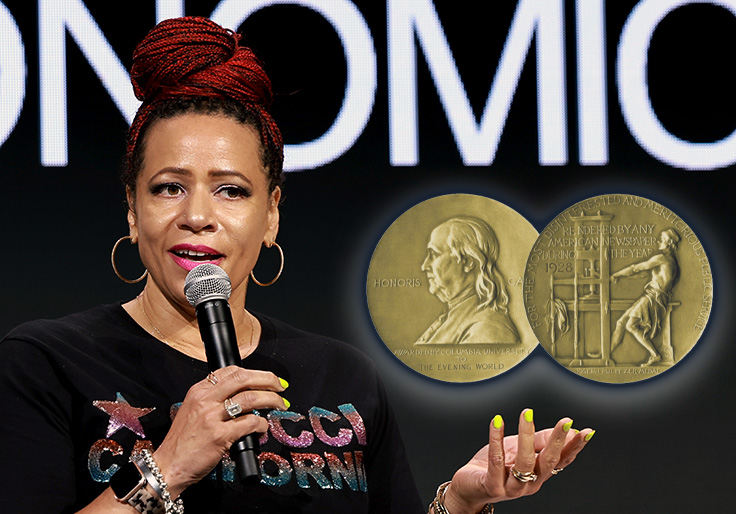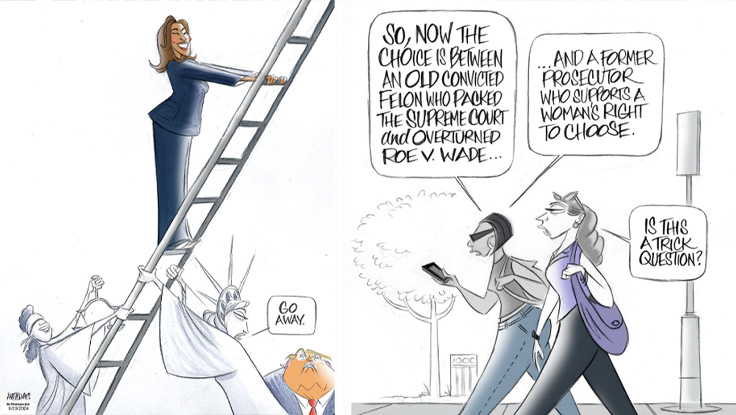This year’s winners include: A ‘reconsideration’ of Huckleberry Finn from a slave’s perspective, a ‘musical call to action’ on climate change, a Palestinian poet who wants to ‘stop talking about Hamas’

Mainstream journalists have yet to embrace the cultural “vibe shift” triggered by Donald Trump’s election in 2024 (and probably never will before the entire industry collapses in a heap of financial ruin). The winners of this year’s Pulitzer Prizes, announced Monday, suggest the media remain as determined as ever to advance their radical left-wing political agenda despite the fact that most Americans find it weird and obnoxious. Five years after the Pulitzer board honored Nikole Hannah-Jones, creator of the controversial 1619 Project, for her “provocative” journalism that inspired “public conversation about the nation’s founding” (not least among historians who assailed its inaccuracy), it’s remarkable how little has changed.
Some context: Trump sued the Pulitzer board for libel in 2022 after the board publicly reaffirmed the 2018 awards it gave the New York Times and Washington Post for reporting on Trump’s alleged ties to Russia, much of which was undermined by special counsel Robert Mueller’s investigation. Efforts to get the case tossed out of court have not been successful thus far. Here are a few of the most absurd examples from this year’s Pulitzers:
Public Service
ProPublica, the nonprofit news outlet funded by Apple widow Laurene Powell Jobs and other rich liberals, won for its reporting on a series of deaths allegedly attributable to state abortion laws. The reporting was credibly denounced as misleading if not deliberately deceptive, especially with respect to the 2022 death of Amber Thurman, a Georgia woman who died after experiencing a rare complication from abortion pills. Ben Crump, the high-profile civil rights attorney, filed a lawsuit on behalf of Thurman’s family arguing the doctors, not state law, were to blame for her preventable death.
National Reporting
The Wall Street Journal took home the prize for its widely denounced (but accurate) reporting on Joe Biden’s cognitive decline. Just kidding. The Journal has been frequently snubbed by the Pulitzer board due to its affiliation with conservative billionaire Rupert Murdoch. For example, the paper did not win a Pulitzer for exposing Theranos founder Elizabeth Holmes as a complete fraud. The Journal won this year, however, for a series of articles “chronicling the political and personal shifts” of Elon Musk, as well as his alleged use of “illegal drugs.”
Breaking News
This year’s award went to a group of local reporters in North Carolina for their coverage of Hurricane Helene and its aftermath. Nope, wrong again. Journalists didn’t care about the hurricane and its (rural white) victims at the time, and they still don’t. Instead, the Washington Post was recognized for its coverage of the attempted assassination of Donald Trump in July 2024. The paper’s initial report on the obvious shooting read as follows: “Trump taken away after loud noises at rally.” The reporter who led the coverage, Isaac Arnsdorf, is one of the few journalists who hasn’t quit the Post in protest. He probably won’t be there much longer now that he has a Pulitzer to take to the New York Times.
Feature Writing
Mark Warren won for his “sensitive portrait” of Bubba Copeland, an Alabama pastor and small town mayor who committed suicide after a local website revealed that he had posted “graphic memes,” transgender pornography, and “gruesome” works of “erotic fiction” on social media. Some of the posts contain real images of children from his community. Warren coauthored Harry Reid’s memoir, and has worked on books with several other prominent Democrats including Senators Chris Murphy and Adam Schiff.
Commentary
Mosab Abu Toha, a “Palestinian poet” and visiting scholar at Syracuse who taught English for the controversial United Nations Relief and Works Agency (UNRWA), won for his New Yorker essays on the “physical and emotional carnage in Gaza.” In an interview with NPR last year, Abu Toha said media outlets should “stop talking about Hamas” because Israel was to blame for the Oct. 7 attack and the “genocide” that followed. Not surprisingly, he was a visiting fellow at Harvard in 2019-20.
Breaking News Photography
Doug Mills of the New York Times won for the iconic images of Trump he took during the assassination attempt in Butler, Pa., including one shot that appeared to show a bullet whizzing past his head. Days after the photos were published, several journalists “worried privately” in interviews with Axios that the images “could turn into a kind of ‘photoganda,’ with the Trump campaign using them to further their agenda” and win the election. The photo editor at a major news outlet argued it was “dangerous” for publications to keep sharing the photos, particularly the ones of Trump giving a defiant fist pump with blood running down his face, “despite how good [they are].”
Fiction
Percival Everett won for James, an “accomplished reconsideration” of Adventures of Huckleberry Finn courageously told from the slave’s perspective in which the protagonist, Jim, has “extended internal dialogues with Jean-Jacques Rousseau, Voltaire and John Locke, sometimes about slavery.” Everett’s derivative novel beat out The Unicorn Woman by Gayl Jones, described as “a riveting tale set in the Post WWII South, narrated by a Black soldier who returns to Jim Crow and searches for a mythical ideal.”
Drama
Branden Jacobs-Jenkins won for Purpose, a play about a prominent black family of wayward grifters loosely based on Jesse Jackson and his convicted felon son. “Its title suggests a singularity of motivation that the play, for better and worse, never comes close to evoking—or achieving,” the Guardian‘s Jesse Hassenger wrote in a lukewarm review that panned the awkward dialogue, which often came across “like a hasty solution to writing problems that Jacobs-Jenkins couldn’t quite crack.”
History
The Pulitzer board chose two winners in this category, presumably because they didn’t want to decide whether Native Americans were more oppressed than black people. Edda L. Fields-Black won for her “richly textured and revelatory account of a slave rebellion,” and so did Kathleen Duval for what the New York Times called a “magisterial overview of a thousand years of Native American history ‘inspired and informed’ by Native scholars, artists, and activists.” The sole runner up in the category, by Seth Rockman, was a “material history of American slavery.”
Memoir
Tessa Hulls won for Feeding Ghosts, a “deeply moving graphic novel about three generations of Chinese women, exploring love, grief, exile, and identity.” It’s somewhat shocking that the Pulitzer board did not give top honors to I Heard Her Call My Name: A Memoir of Transition by trans author Lucy Sante, who was also considered for the “questioning yet clear-eyed narrative” of transitioning to a woman at age 69.
Music
Susie Ibarra won for Sky Islands, described as “a musical call to action, calling awareness to dwindling biodiversity, changing climate and global community practices.” She managed to beat out Jim is Still Crowing, a “challenging and meaningful work” by Jalalu-Kalvert Nelson that uses a “variety of techniques and textures to convey the ongoing battle against second-class citizenship for Black and Brown people and their struggle for acceptance.”
Cartoon Drawing
Ann Telnaes was a sure bet to win for “illustrated reporting and commentary,” and so she did. The former Washington Post cartoonist resigned in a huff earlier this year after the paper’s owner, Amazon founder Jeff Bezos, spiked her dumb drawing of Bezos and other tech billionaires kneeling before Trump with bags of cash. The Pulitzer board lauded Telnaes for her “piercing commentary” and “fearlessness.” See below for examples of her groundbreaking work. Powerful stuff.

Original News Source – Washington Free Beacon
Running For Office? Conservative Campaign Management – Election Day Strategies!
